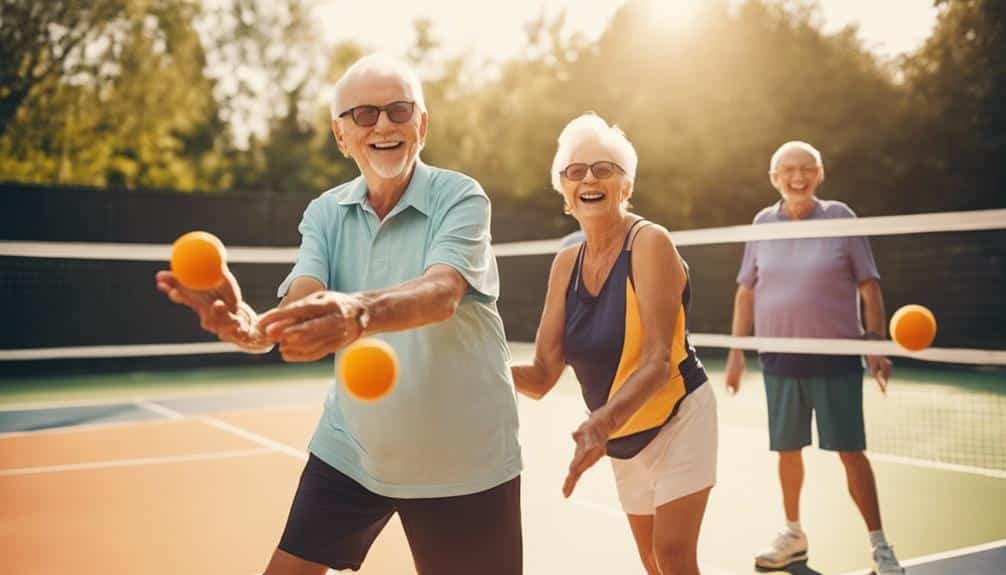Pickleball's explosive growth has revealed an unexpected benefit: a surge of gratitude among players. As I've observed, this fast-paced sport fosters a unique environment where appreciation thrives. On the court, I've seen players express thanks for good plays, supportive teammates, and even challenging opponents. This culture of gratitude extends beyond the game, improving mental health, strengthening relationships, and building vibrant communities. The low-impact nature of pickleball makes it accessible to all ages, further amplifying its positive impact. By focusing on mindful moments and expressing appreciation, players enhance their performance and overall enjoyment. The power of gratitude in pickleball is transforming lives in surprising ways.
Key Takeaways
- Pickleball fosters gratitude by creating opportunities for mindful moments and psychological growth during gameplay.
- Expressing gratitude to opponents and teammates strengthens relationships and builds a supportive pickleball community.
- Practicing gratitude in pickleball shifts focus from mistakes to improvement, enhancing performance and enjoyment.
- Gratitude in pickleball extends beyond the court, positively impacting players' overall mindset and well-being.
- The sport's unique blend of competition and camaraderie naturally cultivates an environment of appreciation and thankfulness.
The Rise of Pickleball
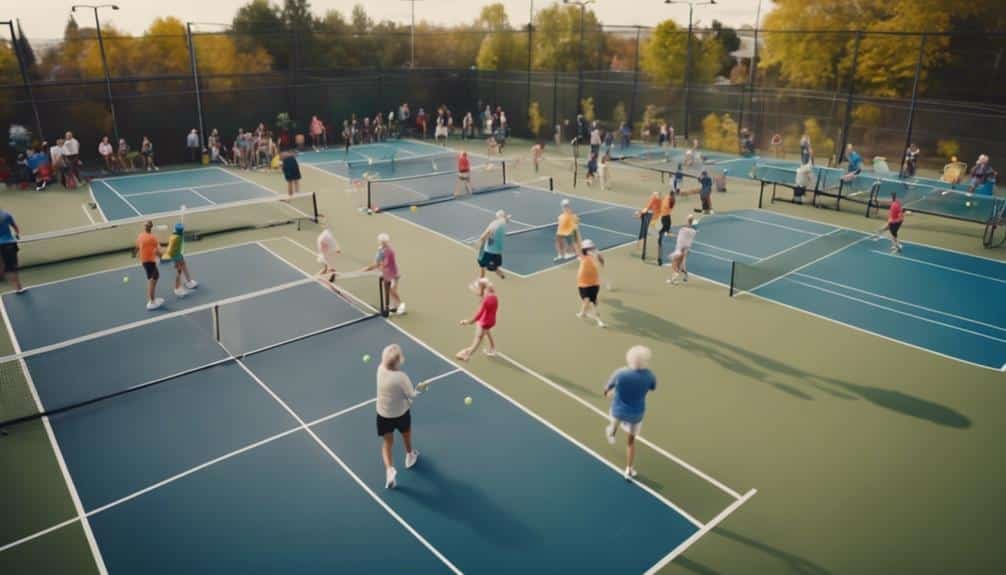
Pickleball's meteoric rise in popularity has transformed it from a niche pastime to one of America's fastest-growing sports.
I've witnessed firsthand the pickleball boom that's swept across the nation, turning community centers and parks into hubs of activity.
This social phenomenon has captivated players of all ages, creating a unique blend of competition and camaraderie.
As I've delved into the sport's growth, I've found that pickleball's appeal lies in its accessibility and potential for quick skill development.
The low-impact nature of the game makes it ideal for seniors, while its fast-paced action attracts younger players.
I've observed how pickleball has fostered a sense of community, bringing people together who mightn't have otherwise connected.
This social aspect, combined with the health benefits of regular exercise, has fueled pickleball's exponential growth and solidified its place in American sports culture.
Gratitude on the Court
Stepping onto the pickleball court, I've discovered that gratitude can be a powerful tool for enhancing both performance and enjoyment of the game.
By focusing on the positive aspects, I've found that my mental clarity improves and stress reduces during gameplay. I've learned to appreciate the present moment, which has led to better performance and increased happiness on the court.
Expressing gratitude to my opponents, whether silently or verbally, has strengthened relationships and created a more supportive community.
I've noticed that grateful opponents contribute to a positive atmosphere, fostering a sense of belonging among players. By acknowledging good plays and showing court appreciation, I've shifted my focus away from mistakes and towards improvement.
This practice of gratitude has become a habit, allowing me to fully embrace the benefits pickleball offers, from exercise to social connections.
Physical Benefits of Pickleball
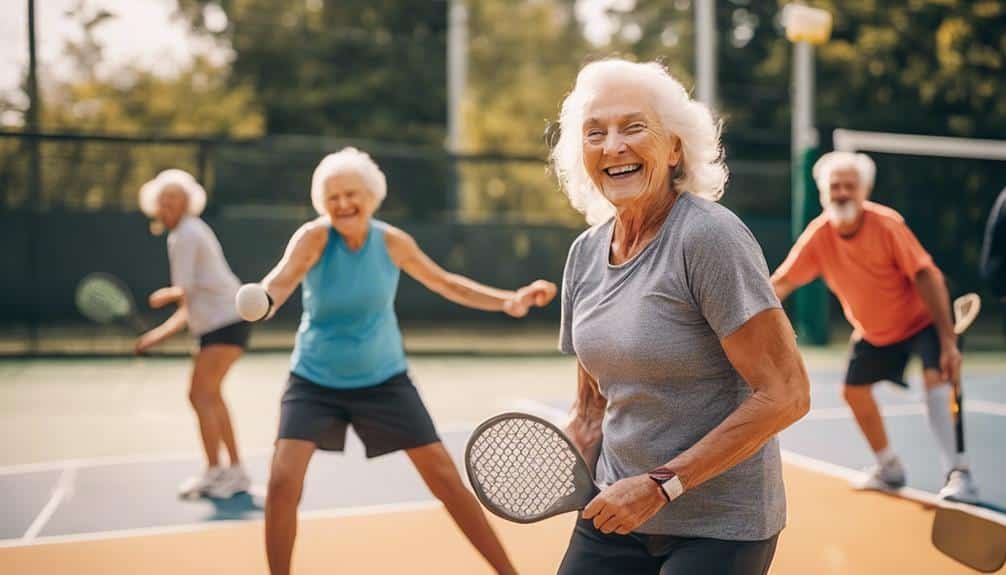
The physical advantages of pickleball extend far beyond the court, offering a comprehensive workout that engages multiple muscle groups and improves cardiovascular health.
As I've experienced firsthand, this sport adapts to various fitness levels, making it accessible for players of all ages and abilities.
The low-impact nature of pickleball significantly aids in injury prevention, especially for those with joint concerns.
I've noticed remarkable improvements in my agility, balance, and hand-eye coordination since taking up the sport.
The quick movements and strategic gameplay have enhanced my reflexes and decision-making skills.
Moreover, the social aspect of pickleball encourages consistent participation, which is crucial for maintaining long-term fitness goals.
Mental Health and Pickleball
While the physical benefits of pickleball are substantial, I've found that its impact on mental health is equally profound and deserves careful examination.
Through the lens of sport psychology, I've observed how pickleball provides numerous opportunities for mindful moments and psychological growth.
- Stress reduction through focused gameplay
- Improved mood and decreased symptoms of anxiety and depression
- Enhanced cognitive function and memory
- Increased social connections and sense of community
These benefits stem from the unique combination of physical activity, social interaction, and strategic thinking that pickleball offers.
As I've delved deeper into the sport's psychological aspects, I've realized that pickleball isn't just a game—it's a powerful tool for mental well-being.
Building Community Through Play
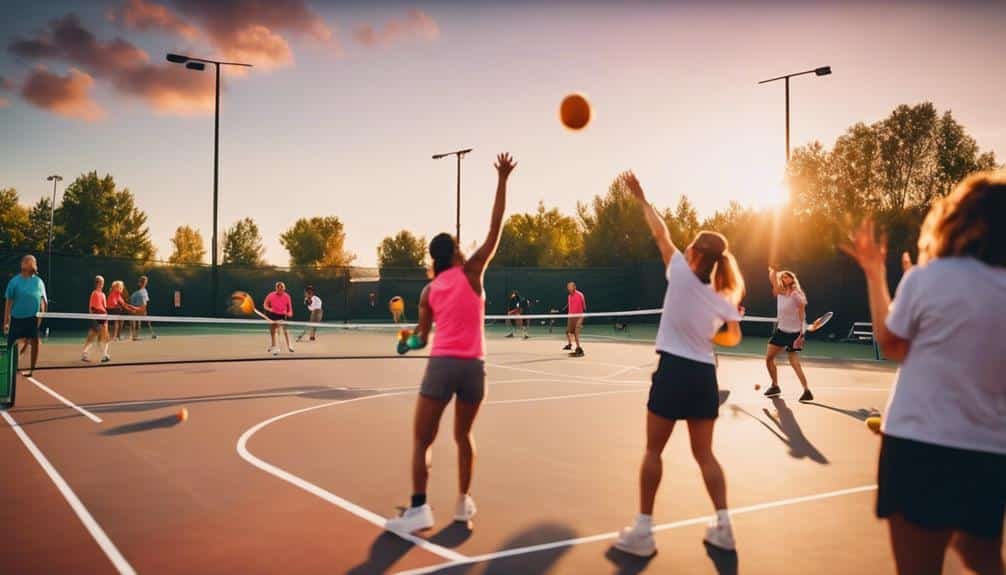
Pickleball's unique ability to foster connections has transformed it from a mere sport into a powerful catalyst for community building.
I've witnessed firsthand how this game acts as a magnet for Community Builders, drawing people together and forging Social Bonds that extend beyond the court.
The shared experience of learning and improving creates a supportive environment where players of all levels can thrive.
I've observed how the pickleball community values open-mindedness and growth, encouraging players to share their passion and knowledge.
This collective spirit of appreciation strengthens relationships and cultivates a sense of belonging.
The gratitude expressed for others' contributions further cements these connections, creating a tight-knit network of players who support each other both on and off the court.
In essence, pickleball serves as a conduit for building a vibrant, interconnected community united by a common love for the game.
Cultivating Gratitude in Sports
How can athletes harness the power of gratitude to enhance their performance and overall experience in sports like pickleball?
As a sport psychologist, I've observed that incorporating gratitude practices can significantly impact an athlete's mindset and performance. The field of Sport Psychology emphasizes the importance of mental preparation, and gratitude is a powerful tool in this arsenal.
Four ways to cultivate gratitude in sports:
- Start a gratitude journal, noting positive aspects of your game
- Practice mindful appreciation during warm-ups
- Express thanks to teammates, opponents, and officials
- Reflect on personal growth and achievements post-game
Overcoming Challenges With Appreciation
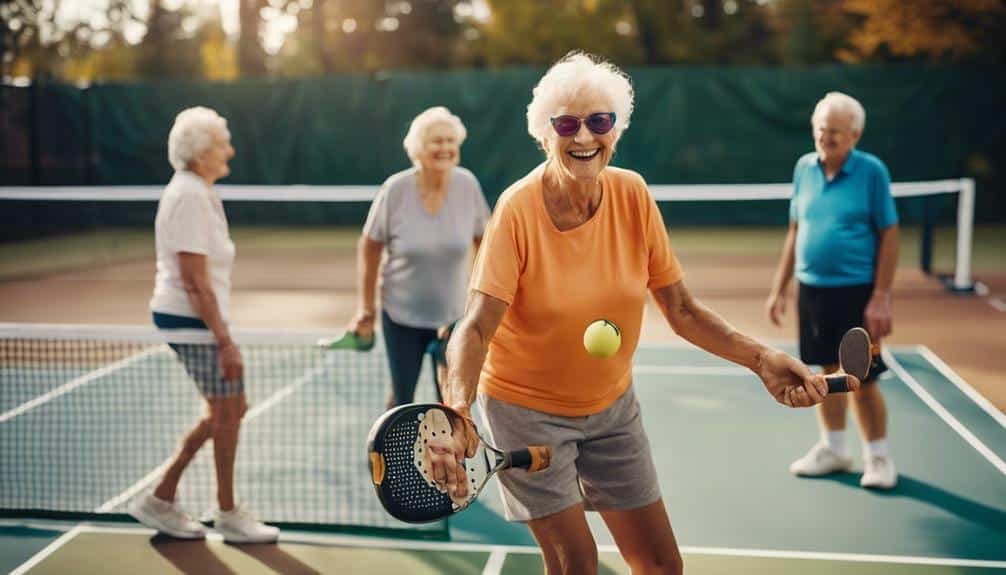
Challenges in pickleball can be transformed into opportunities for growth when viewed through the lens of appreciation.
I've found that adopting an appreciative mindset allows me to reframe obstacles as chances to improve. When I face a difficult opponent, I'm grateful for the opportunity to test my skills and learn new strategies.
By practicing challenge reframing, I've turned frustrating moments into valuable lessons. For instance, when I struggle with a particular shot, I appreciate the chance to refine my technique.
This approach hasn't only enhanced my performance but also strengthened my bonds with fellow players. We support each other through setbacks, recognizing that every challenge contributes to our collective growth.
Pickleball's Impact on Relationships
Beyond personal growth, I've observed that pickleball's most profound impact lies in its ability to forge and strengthen relationships among players.
The sport creates a unique environment where social bonds flourish, transforming strangers into 'Pickle Pals.' Through shared experiences on the court, players develop connections that extend far beyond the game.
I've witnessed firsthand how pickleball fosters a sense of community and belonging among diverse groups of people.
The sport's impact on relationships is evident in:
- Increased social interactions and new friendships
- Strengthened family bonds through intergenerational play
- Enhanced communication skills through on-court partnerships
- Expanded social networks and support systems
These connections contribute to improved mental health and overall well-being.
The pickleball community's supportive nature encourages players to express gratitude for their fellow athletes, creating a positive feedback loop that reinforces social bonds and enhances the overall playing experience.
Mindfulness in Every Serve
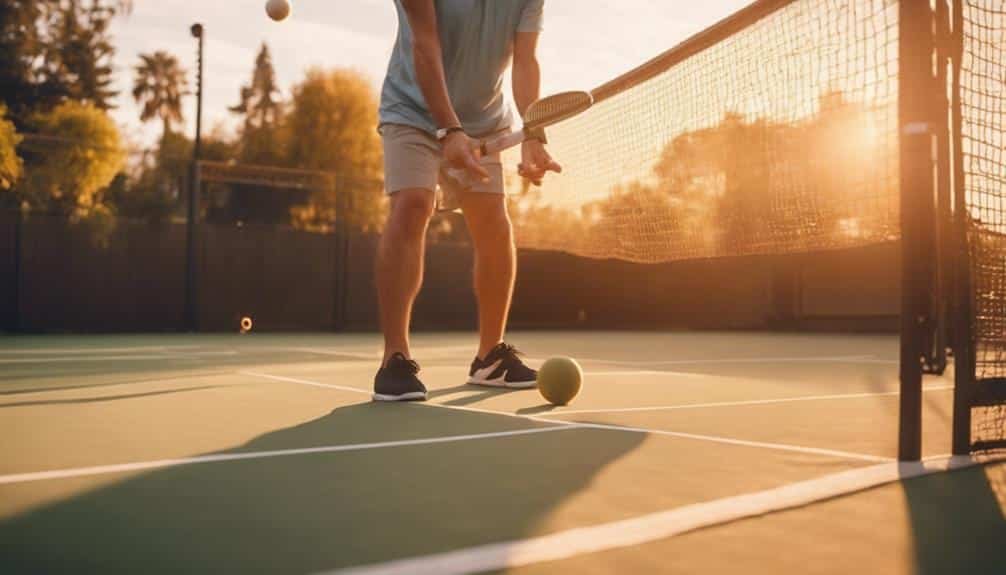
With each serve in pickleball, players have a unique opportunity to practice mindfulness and enhance their mental game.
I've found that focusing on mindful moments during serves can significantly improve my performance. By taking a deep breath and centering myself before each serve, I create a brief pause to cultivate gratitude.
These grateful serves not only help me stay present but also boost my confidence and reduce stress. I've noticed that when I approach each serve with mindfulness, I'm more likely to execute it accurately and with intention.
This practice has transformed my game, allowing me to appreciate the present moment and connect with my opponents on a deeper level. By incorporating mindfulness into every serve, I've discovered that pickleball offers more than just physical benefits—it's a pathway to mental clarity and improved overall well-being.
The Ripple Effect of Thanks
Expressing gratitude on the pickleball court can create a powerful ripple effect that extends far beyond the boundaries of the game.
When I take a moment to acknowledge Grateful Moments, I'm not just improving my own experience; I'm influencing the entire community.
The Ripple Effect of thanks can transform the atmosphere, fostering a more positive and supportive environment for all players.
- It encourages others to express appreciation
- It builds stronger connections between players
- It enhances overall enjoyment of the game
- It creates a culture of mutual respect and support
Conclusion
As I reflect on my pickleball journey, I'm struck by how this seemingly simple game has become a wellspring of gratitude.
Like a pebble tossed into a pond, each match sends ripples of appreciation through my life.
The data is clear: improved physical health, enhanced mental well-being, and stronger social connections.
Pickleball hasn't just honed my skills; it's sharpened my ability to recognize and savor life's gifts, both on and off the court.

